#old man leroux
Explore tagged Tumblr posts
Text
Introducing a new character: Old Man Leroux.
Old Man Leroux was an elderly gentleman of African descent living in Louisiana. He'd lost his beloved wife of 63 years, they'd been married since they were 18. They married one month after her birthday.
Old Man Leroux was a very intelligent and well-spoken man despite his thick cajun accent. He was known to sit on his porch most days reading classic American literature in his late wife's old rocking chair, his ebony cane leaned against the siding of his house just within reach.
Children and young adults were known to stop by to visit, whether that was for peppermints or a light chat and interesting stories. He never admitted it, but everyone knew his favorite was the tiny slip of a girl with scraped knees and tattered clothes. When her mother let her hair go too long without care he painstakingly brushed and trimmed just as his wife had taught him. When her stomach growled with hunger he invited her in for a home cooked meal, filled with seafood, vegetables, and bright red spice. When the girl came up with bruises he sat her down with packs of frozen vegetables, his deceptively strong hands breaking apart the icy contents to comfortably press it to her injuries.
When the fire broke out he prayed for his best girl to have escaped. He sobbed with grief when she never showed again. He was the one that told the police of her existence. After the arrest of her mother he took responsibility of planning the funeral. He gave her the best he could, a lovely casket, delicate floral arrangements that included baby's breath and forget-me-nots. When the funeral concluded and her casket was lowered he hosted a party. The whole street attended, they ate and drank and made merry while a brass band played over the radio. Even if they didn't speak to the tiny slip of a girl, they all felt her loss. They all knew they'd never see the girl again, sitting upon Old Man Leroux's porch steps as he rocked and sang and read to her.
#little ghoul#the band ghost#cardinal copia#cirrus ghoulette#papa emeritus 4#sunshine ghoulette#mountain ghoul#sodo ghoul#aether ghoul#dewdrop ghoul#cumulus ghoulette#swiss ghoul#rain ghoul#phantom ghoul#aurora ghoulette#little ghoul's life#old man leroux
11 notes
·
View notes
Text

Lerik
#poto#phantom of the opera#the phantom of the opera#gaston leroux#erik phantom#leroux erik#opera ghost#erik poto#tpoto#ACFS Erik#ACFSart#I think Lerik should always be an old man… creaky bones.#My designs change so much so this is more like my Erik#But I digress#He’s very lovely to me.
40 notes
·
View notes
Text
Sorry I have been posting less just been busy with school and stuff
Here is some sketches I made :3
Ignore my awful handwriting I promise that it’s better then that 😭🙏🏻




Most recent 💕
#phantom of the opera#poto#erik the phantom#daroga#pharoga#gaston leroux#old man yaoi#toxic old man yaoi#traditional art#poto art
10 notes
·
View notes
Text

by hyohakubako @ skeb
#the angel in hell ; lucien leroux#reposting everything from my old blog... slowly#man-made-weapon and man-made weapon ; lucien & camille#if i had another tag for them it's now going to be this one you know :b#middle aged catboy belongs to my husband @kesil. a meow meow
7 notes
·
View notes
Text
Oh my god this is SO GOOD
I also like the idea of Daroga having internalized homophobia and feeling guilty about his feelings for Erik. He shouldn't feel desire and romantic affection for a man, and for a man so complicated and morally ambiguous like Erik. UUUUGH THE ANGSTY
The Case for Pharoga as Canon


Pharoga, noun, def. the relationship between Erik, the Phantom of the Opera, and the Daroga of Mazandaran. Friends, enemies, lovers, exes. A relationship that could be platonic or amorous or sexual. I don’t just ship Pharoga, I believe it is canon, right there in the text.
Consider the above excerpt from Chapter XX: The Viscount and the Persian. Raoul himself asks the question we should all be wondering: Why do you, sir, care about Christine Daaé? Raoul himself draws the parallel for us. Raoul is following the Daroga into Erik’s lair to save Christine because he loves her. The Daroga doesn’t love Christine, but he should hate Erik. And yet, just like Christine, although he has every reason to hate Erik, he does not.
So why is the Daroga leading Raoul down into Erik’s home? To save a girl he does not love or to save his friend, who is making a terrible mistake?
When in the story is the Daroga not pursuing Erik? He was first sent to Russia to find Erik for the Shah and he never stopped looking. The Daroga chases Erik across continents and down cellar holes - just to save other people from Erik? Or because he is even more of a stalker than Erik himself?
While the Daroga is often the sanest person in the room and is seen as the heart and moral compass of the story - he is not an innocent! He delivered Erik to the Shah, where he became an executioner. The Daroga was a part of the court and witnessed these events, which he facilitated. He confesses to following Erik out of a sense of guilt, to try to prevent further deaths. But could it be that beneath the guilt, the Daroga is driven by something else? Maybe desire, love, jealousy? Certainly, even after Erik very nearly succeeded in killing the Daroga in both the lake and the torture chamber, he found pity in his heart for Erik:

What can explain this? After everything Erik did to the Daroga, why would Erik still come to him for his last confession? Why would Daroga hear it? Their relationship runs very deep; a little attempted murder cannot shake the intimacy they share. I tend to see this intimacy as love and even romantic love. The Daroga follows Erik obsessively after Christine is abducted not so much out of a desire to protect her, but out of a lover’s need to know. Out of jealousy.
What does the Daroga represent to Erik? He says he is Erik’s conscience, reminding him of his promise not to kill any more people. But the Daroga also carries with him all the knowledge and memory of Erik’s time in Mazandaran, while Christine represents the new life that Erik wants to create. Erik does not want the Daroga to follow him, to interfere, to make him feel guilty about abducting Christine or to remind him of his painful past. And still, the Daroga follows him like a shadow. A shadow’s shadow. He is a much more complex character than he seems at first. And that is why I think Erik loved him.
#old man yaoi#angst mlm#honestly i headcanon daroga as gay#the phantom of the opera#erik#art#poto#gothic literature#gaston leroux#pharoga#daroga#the persian#gay#mlm#lgbtqia+#queer
156 notes
·
View notes
Text

Incredibly mixed feelings. An old redraw of Auguste Leroux, Dankovskii the terrible horrid puppet thing performs a miracle autopsy on the immortal man.
582 notes
·
View notes
Text
References in Servamp
Arabian mythology
Jinn. Ch. 16
Greek mythology
Elpis. Ch. 75
Moirai. Ch. 108
Pandora. Ch. 130
Pygmalion. Ch. 123
Pandora's Box. Ch. 97
Japanese mythology
Gashadokuro. Ch. 129
Kitsune. Ch. 3
Raijin. Ch. 85
Norse mythology
Baldr. Ch. 39
Bifröst. Ch. 88
Brunhild. Ch. 88
Fimbulwinter. Ch. 40
Freya. Ch. 65
Frey. Ch. 131
Gleipnir. Ch. 101
Hati. Ch. 91, 131
Hod. Ch. 39
Hliðskjálf. Ch. 96
Idunn. Ch. 65
Loki. Ch. 15
Mimir. Ch. 29
Mjölnir. Ch. 53
Ragnarök. Ch. 101, 122, 131
Sigurd. Ch. 101
Thor. Ch. 41
Yggdrasil. Ch. 42
Biblical references
Abel. Ch. 8
Adam. Ch. 128
Boaz and Jachin. Ch. 42
Eden. Ch. 21
Eve. Ch. 1
John the Baptist. Ch. 122
Judith. Ch. 147
Lucifer. Ch. 135
Noah. Ch. 145
Nod. Ch. 29, events
Hinduism
Asura. Ch. 57.5, 89.
Tarot
The Fool - Mahiru. Ch. 50
I. The Magician – Night trio. Ch. 41
II. The High Priestess – Mikuni. Ch. 42
V. The Hierophant - Shuhei. Ch. 77
X. Wheel of Fortune - Junichiro. Ch. 53
XII. The Hanged Man - Tsurugi. Ch. 50
XV. The Devil – Shamrock. Ch. 72
XVI. The Tower - Touma. Ch. 47
XVII. The Star - Iduna. Ch. 73
XVIII. The Moon - Yumikage. Ch. 69
XX. Judgement - Mikuni. Ch. 144
Literary references
"Alice's Adventures in Wonderland" Lewis Carroll. Ch. 3, 4, 7, 19, 98, 122. Misono, Lily, Dodo, Mitsuki, Yamane, Hattori, Mikuni, Bad B and Good B.
"As You Like It" William Shakespeare. Ch. 10, 38.5. Mikuni's spell.
"My Fair Lady" English nursery rhyme. Ch. 10 Mikuni's spell.
"Dracula" Bram Stoker. Ch. 12, 30. Hugh.
"Romeo and Juliet" William Shakespeare. Ch. 23, 34. Hyde, Ophelia.
"Faust" by Johann Wolfgang von Goethe. Ch. 29 Johannes.
"Through the Looking-Glass" Lewis Carroll. Ch. 29, events. Mikuni, Johannes.
"Julius Caesar" William Shakespeare. Ch. 23, 84. Hyde.
"Strange Case of Dr. Jekyll and Mr. Hyde" Robert Stevenson. Ch. 23, 37. Hyde, Licht.
"Macbeth" William Shakespeare. Ch. 24, 31. Kuro, Saint Germain, Mahiru.
"Night on the Galactic Railroad" Kenji Miyazawa. Ch. 26, 142. Higan, Tsubaki.
"The Little Prince" Antoine de Saint-Exupéry. Ch 30, 67. Kuro, Mahiru, Sloth demon, Gear, probably Jeje.
"Hamlet" William Shakespeare. Ch. 33, 34. Hyde, Ophelia.
"The Phantom of the Opera" Gaston Leroux. Ch. 36 Licht and Hyde technique.
"Peter and Wendy" James Barry. Ch. 44, 56, 74. Tsurugi, Touma, Mahiru.
"Ring a Ring o' Roses" nursery rhyme. Ch. 53 Junichiro's spell.
“Peter Pan in Kensington Gardens” James Barry. Ch. 53, 75. Tsurugi, Touma.
"Death in Venice" Thomas Mann. Ch. 55 Gilbert technique.
"Total Eclipse" a play by Christopher Hampton. Ch. 55 Rayscent's technique.
"The Morning of the Last Farewell" Kenji Miyazawa. Ch. 57.5 Tsubaki.
"Spring and Asura" Kenji Miyazawa. Ch. 57.5 Tsubaki.
"The Catcher in the Rye" Jerome Salinger. Ch. 62 Shuhei.
"Four and Twenty Blackbirds" Agatha Christie. Ch. 62 Shuhei's spell.
"Metamorphosis" Franz Kafka. Ch. 62 Shamrock technique.
“The Nighhawk's Star” Kenji Miyazawa. Ch. 62, 76. Shamrock technique.
"Rock-a-bye Baby" an English lullaby. Ch. 70 Touma's spell.
“Schlafe, mein Prinzchen, schlaf ein” lullaby. Ch. 70 Touma's spell.
"Who Killed Cock Robin" an English nursery rhyme. Ch. 70 Yumikage's spell.
"The Wonderful Wizard of Oz" Lyman Frank Baum. Ch. 70, 88. Tsukimitsu brothers’ spells.
"Daddy-Long-Legs" Jean Webster. Ch. 74. Dark Night Trio, Touma.
"King Lear" William Shakespeare. Ch. 86. Hyde.
"The House of the Sleeping Beauties" Yasunari Kawabata. Ch. 86. Iori.
"The Divine Comedy" Dante Alighieri. Ch. 118, 120, 121. Niccolo, Ildio, Gluttony demon.
“A Brute's Love” (人でなしの恋) Edogawa Rampo. Ch. 122 Mikuni, Lily.
"Coppelia" ballet Leo Delibes. Chapter 122 Mikuni, Lily.
"Salome" Oscar Wilde. Ch. 122, 147. Mikuni, Lily.
"Turandot" opera by Giacomo Puccini based on the play by Carlo Gozzi. Ch. 129, 136. Lily.
"The Tempest" William Shakespeare. Ch. 131. Licht and Hyde.
"The Old Man and the Sea" Ernest Hemingway. Ch. 134 Hugh.
"Flowers for Algernon" Daniel Keyes. Ch. 135 Hugh.
"Jane Eyre" Charlotte Brontë. Ch. 136. Hokaze.
"Madama Butterfly" opera by Giacomo Puccini. Ch. 136. Lily.
"Hansel and Gretel" the Brothers Grimm. Ch. 140. Faust and Otogiri.
"Girl Hell" Yumeno Kyusaku. Ch. 147. Mikuni, Noah.
Music
"Für Elise" by Ludwig van Beethoven. Ch. 34
"Jesu, Joy of Man's Desiring" by Johann Sebastian Bach. Ch. 125
Sonata No. 17 "Tempest" by Ludwig van Beethoven. Ch. 131
Movies
"It's a Wonderful Life" (1946). Ch. 131
"Life is Beautiful" (1997). Ch. 131
I believe this list can be expanded. Somewhere I’ve written only chaps when some reference was mentioned for the first time and omitted all further mentions.
Special thanks to hello-vampire-kitty, joydoesathing and passmeabook, because some works wouldn’t be included in the list without their observations.
281 notes
·
View notes
Text
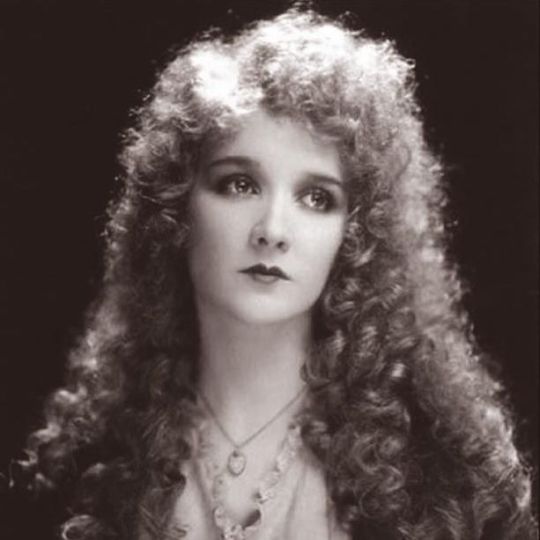

Propaganda
Mary Philbin (Phantom of the Opera, The Man Who Laughs)— I must simply say I love Mary Loretta Philbin. She was known for her, in the words of Wikipedia, ethereal screen presence. In fact, Pat O' Malley says it best, "If I were superstitious I would think that the spirit of some great tragedienne of a forgotten past slipped into Mary's soul when she heard the camera begin to click." I first saw her in the Phantom of the Opera adaptation of 1925, where she plays a very interesting rendition of Christine Daae (I would argue a foundational performance, since this was the first mainstream portrayal of the character outside of Gaston Leroux's 1910 book) opposite Lon Chaney as the title character, and I Loved her performance, and ofc developed a bit of a crush on her. After her years in Hollywood, she stopped acting in 1930 and lived the rest of her life in relative peace. One fact that always stuck with me was the fact that later in her life, she very rarely made public appearances, but did in fact do so in order to attend the Los Angeles opening of Andrew Lloyd Webber's Phantom of the Opera. And if all that isn't enough to convince you, look at a photo of her. She is really, stunningly beautiful.
Musidora (The Vampires)—none other than THE irma vep lady—but never mind that, you know her as the sexy bat! [image under the cut]
This is round 2 of the tournament. All other polls in this bracket can be found here. Please reblog with further support of your beloved hot sexy vintage woman.
[additional propaganda submitted under the cut.]
Mary Philbin:
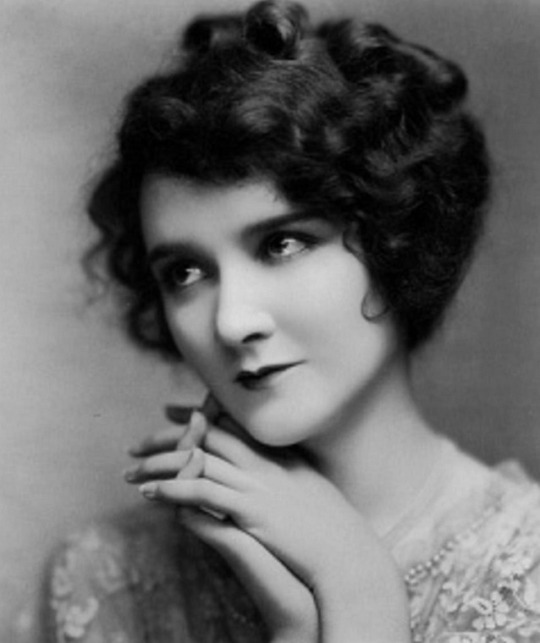
She is hot?
Shes just so cute
Mary Philbin started acting after winning a beauty contest hosted by Universal Pictures and went on to star in a number of films, including one of the most iconic silent horror films of her era, "the Phantom of the Opera". She also gave a sweet, heart-wrenching performance in "The Man Who Laughs" alongside Conrad Veidt.
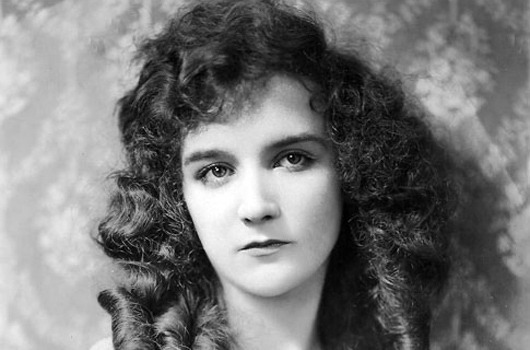
Musidora:
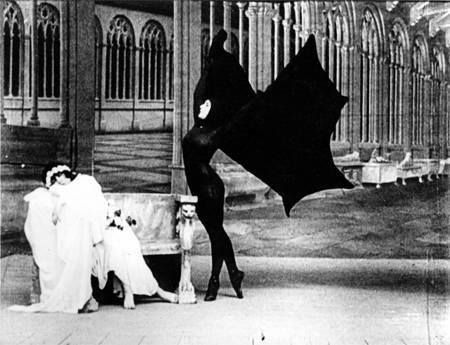
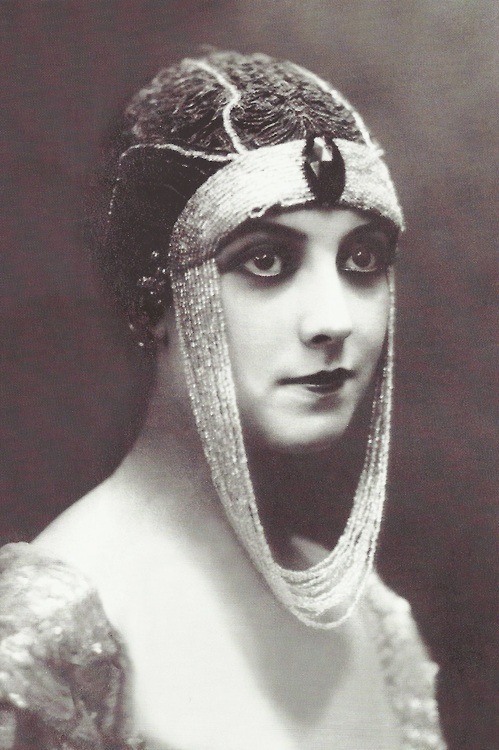
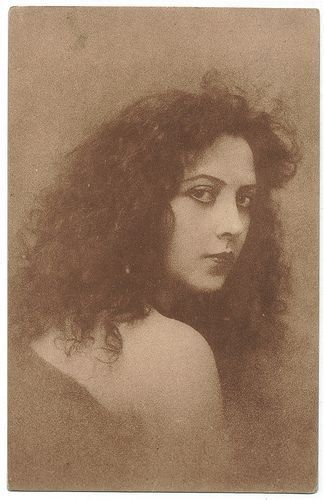
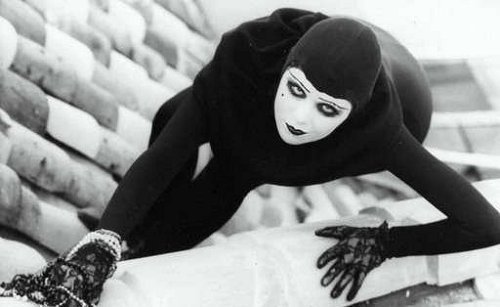
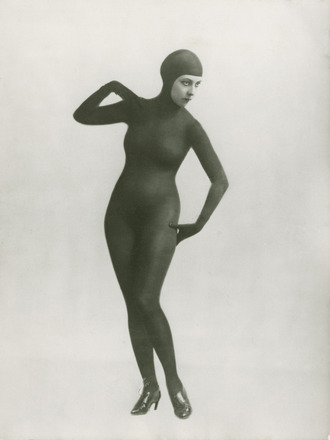
"She’s the original dark mysterious film beauty. Also I think the name Musidora is badass."
196 notes
·
View notes
Text
The Raoul (de Chagny) Navy: An Exploration of the Vicomte's Naval Background:
Our beloved Vicomte, Raoul de Chagny, is a young junior officer in the French Navy ("le Royale"), but this hardly gets much exploration. It's a detail that is often glossed over--I anticipate because Naval historians and Phans often do not have much Venn diagram overlap--until now. Let's just say my username is a Naval reference.
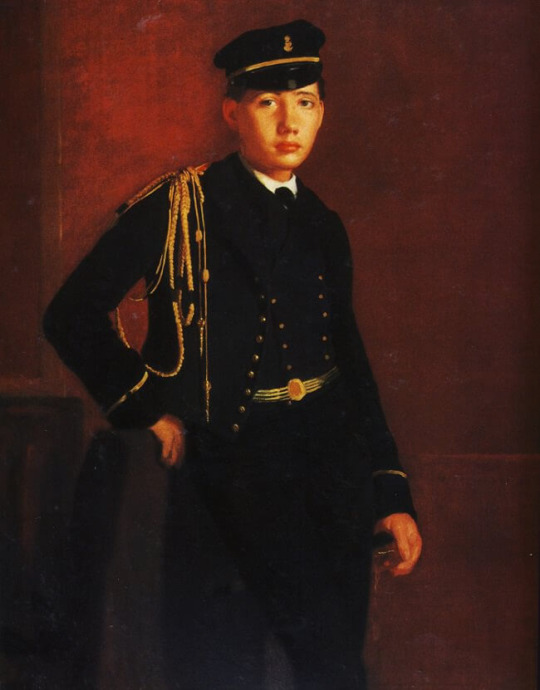
Note: the "Raoul Navy" is not my invention--our hilarious and wise "Phantom Dark Web" friends at Leroux Less Traveled (incl. @box5intern) came up with it, and I love it.
I've started digging into book Raoul and his Naval background and turns out we are missing out a whole lot about Raoul's character background if we don't dig into it. So I'm going to tell you what the book tells us and what that means. I'm going to give you the overall pieces up front, and then explain:
Raoul looks very young and feminine (except for his "little" mustache, which he effectively has grown to prove that he can)--and everyone treats him like a baby
Raoul at this point has already completed three years of Naval training including a world tour, so he is fairly experienced and even worldly for his age. He is described in the French as a "cadet", but he would likely be a sub-lieutenant at this point since he has graduated from the Naval Academy.
He's on a six month leave before going on a very dangerous mission to recover remains of a lost Arctic mission--a mission he himself is unlikely to return from.
And everyone still treats him like he's a baby (especially the old dowager widows), even though he has had quite a bit of life at this point--so he has something to prove.
What we know about Raoul and the Navy (Here is the English):
"He was admirably assisted in this work first by his sisters and afterward by an old aunt, the widow of a naval officer, who lived at Brest and gave young Raoul a taste for the sea. The lad entered the Borda training-ship, finished his course with honors and quietly made his trip round the world. Thanks to powerful influence, he had just been appointed a member of the official expedition on board the Requin, which was to be sent to the Arctic Circle in search of the survivors of the D'Artois expedition, of whom nothing had been heard for three years. Meanwhile, he was enjoying a long furlough which would not be over for six months; and already the dowagers of the Faubourg Saint-Germain were pitying the handsome and apparently delicate stripling for the hard work in store for him."
We also learn in another paragraph that the de Chagnys had admiral in the family, so the Naval connection is likely a family business for second sons. Raoul is a second son, so a career as a military officer would have been a distinguished career for him.
Borda: First ship
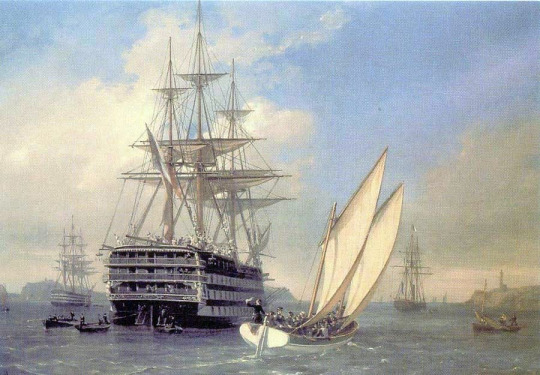
Brest is the main port of the French Navy and home of the Ecole Navale (or French Naval Academy. In the 20th Century it moved, but Brest is still, along with Toulon, a major naval base)
According to the French: Le jeune homme entra au Borda, en sortit dans les premiers numéros et accomplit tranquillement son tour du monde (Note that the French calls him a "young man", not a lad)
The Borda is traditionally the training ship of the French Navy, and there have been six of them. This would have been a cadet/midshipman cruise for Raoul. He would have been on the ex-Valmy, an 120-gun ship of the line, which became the Borda training ship in 1864.
The Borda is also the ship of the Ecole Navale (French Naval Academy)—this means that Raoul attended the academy.
The Naval Academy is two years in Brest, and then their third year is the World Tour—so that timing also aligns with where we are in the book. Raoul would have begun at the academy at 18, and he is at the start of the book, 21 years old.
After the Borda, which he completed with honors, he did an uneventful world tour.
This would have been his third year, still as a midshipman.
He could have been assigned to any ship for this training cruise—possibly a cruiser (the d'Estang is pictured below in 1884 in Algiers), which did long range missions. Note: Their max speed was about 15 Knots (which is a very respectable speed that some warships still transit).
This world tour cold have been as far east as what is now Vietnam, or through the Suez--but likely near French colonies.

With influence, he is assigned to the Requin expedition.
French: Grâce à de puissants appuis, il venait d'être désigné pour faire partie de l'expédition officielle du Requin, qui avait mission de rechercher dans les glaces du pôle les survivants de l'expédition du d'Artois, dont on n'avait pas de nouvelles depuis trois ans.
The Requin was a real ship in the Mediterranean fleet, but did not go on its first mission until 1885, which means that this is a deliberate or unintentional oversight of either Leroux himself or his narrator. The Requin was a steel hull—and the Artois was actually a 18th century Royal Navy ship so this piece is a complete fabrication. However, Arctic missions at this time were frequent and tended not to go well.
However, Raoul could also be excited about getting to go on a new steel-hulled ship. The Redoutable was already in commission—commissioned in 1876. Most of the rest of the fleet at this point were ironclads.
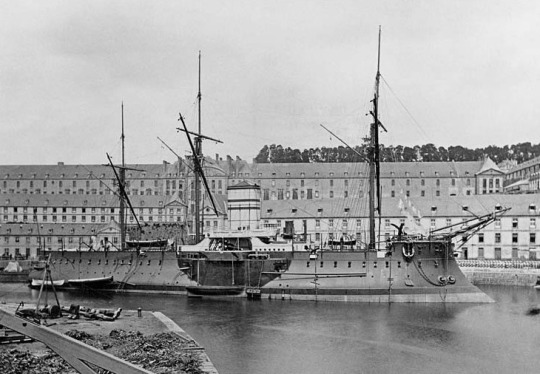
#naval history#phantom of the opera#raoul de chagny#vicomte de chagny#amwriting#phandom#military history#warships#poto#gaston leroux#the raoul navy#french navy#le royale#raoul navy
323 notes
·
View notes
Text
Okay it seems like rlly unpopular opinion in this fandom. I mean I saw a lot of fics, hdcs and posts where leroux!Erik is bi, pan or straighty and always very like VERY horny and very into all that stuff
but
BUT
I'll duplicate some of the thoughts that I wrote earlier. I personally see leroux!Erik as 1000% asexual because c’mon. This man is afraid of touching esp touching women. For him the biggest joy was INNOCENT KISS on the forehead. And judging by his wishes about his marriage where all he does is going for walkies while holding hands, singing and showing magic tricks is….. you know….. This speaks volumes. I bet he doesn't even think about other more physical aspects, for him it is just a fluffy romantic fantasy (and he's prob read hell of a lot snotty romantic novels while kicking his legs and screaming in pillow). He seeks romantic love and he wants to be loved and accepted as he is, but I see it as purely platonic feelings, not physical. And honestly how he treats Christine and calls her my angel, my saviour and all that stuff????? He idealises her to the core and sees her almost like a divine being - pure and kind. Do you really think that he would project his fantasies on her????? (but I highly doubt that he even has them and I see him as a castrato but its a whole different topic for another day) Do you think he would even allow himself to do that???? I bet he would just roll on the floor like sopping wet cat and scream that he's not allowed to touch this pure being with his disgusting cadaverous hands. Erik was SHOCKED that someone WILLINGLY touched him without running away, showed him compassion and understanding even despite his abuse and threats. All that because he thought he didn't deserve it, that he is so ugly that he can't be treated like a normal human being.
Also about that marriage stuff. I think Erik didn't desire the marriage as most ppl do. For him its just a way to prove that he is like everyone else because wakie wakie, it is a 19th century's heteronormative society where if you are single and were never married at almost 50 years old, then something is deeply wrong with you. Erik didn't want to marry in a first place - for him it's just an instrument to fit in in a strict society that rejected him. Honestly its sooooo autistic coded for me (I'm autistic btw). Dude just went too hard in attempt to fit in but failed miserably. Another thing for me that strikes is that the marriage for Erik could be seen as a guarantee that the person he loves will never leave him (bc divorces at that time were an awfully difficult procedure, you know). He was so insecure about himself, scared to death that he would be abandoned, betrayed, and rejected again and then boom, there's a guarantee drop, a wonderful idea that everyone praised and romanticised in all books. Marriage. You don't have to handcuff anyone to the battery and cry on the floor praying not to leave you because the law will do it for you. I think you see where I'm going. I also have high suspicions where's Erik really felt love or he was so lonely and depressed at that point of his life that he accepted an ordinary friendship and politeness as a pure and beautiful love to the grave (literally) and the only chance for happiness. When Christine didn't suspect a thing, he already drew in his diary himself walking with her in the park and framing it with hearts while lying on the bed like a schoolgirl. Again very autistic trait that I've noticed in myself. To think that you are a genius and have thought everything 10 steps ahead, that the person will act according to your plan and that the regular good word (said purely out of politeness by the person who is not interested in you) is the beginning of a great unbreakable friendship for the ages. If you know you know. I rlly see it as Erik imagined himself castles in the air and saw his deep desire for friendship and acceptance as true love. Because all pll are saying that love is great so it 100% must be it, right? ...........................right? The problem with interpreting your true emotions and feelings are unironically hard. Phew, okay. What I'm trying to say is that I see leroux!Erik as an asexual autistic individual. I don't say that it's canon and theres the only way to view this character because what I say is based not only on my unbiased analysis but also on my neurodivergent experience and kinda similar life problems (but much, MUCH LESS serious and with access to therapy and treatment). Pls don't write mean things to me if you disagree, you have your right to do so but do it outside my askbox. I’m open to discussion but not conflicts. Thanks

31 notes
·
View notes
Text
I was thinking and listening to music as one does, and I thought of something I haven't thought of before.
Little Ghoul can speak. Mentally, she has a block that keeps her from doing it. But she can. And her transformation into a Ghoul made speaking hurt, just like Mountain. But she CAN speak. She just doesn't want to.
But she also knows French. Why? Because she's from Louisiana, and Old Man Leroux taught her. Why did Old Man Leroux teach her? Because his children and his grandchildren didn't want to learn, because he wanted to pass on what his French immigrant parents had taught him. He hadn't been born in France, but his parents didn't know English when they moved. They went to Louisiana because they had the best chance of being understood there, even if it was Cajun French.
So Old Man Leroux knows French, and he taught Little Ghoul. Little Ghoul speaks proper French because of Old Man Leroux. I can't unthink it. Its become canon now.
#little ghoul#the band ghost#cardinal copia#cirrus ghoulette#papa emeritus 4#sunshine ghoulette#cumulus ghoulette#aurora ghoulette#mountain ghoul#sodo ghoul#dewdrop ghoul#aether ghoul#rain ghoul#swiss ghoul#french#little ghoul speaks french#proper french#cajun french#she knows both because old man leroux aint a quitter#old man leroux
16 notes
·
View notes
Text

Quick sketch of a younger lerik.. he’s going to miss that hair.
#Favourite bald old man#poto#phantom of the opera#the phantom of the opera#gaston leroux#leroux erik#ACFSart#I either give him long (very stringy) hair or none#So here’s a treat
22 notes
·
View notes
Text
“Hurt” by Johnny Cash (or Nine Inch Nails) reminds me of Erik and Daroga a lot I fear
#phantom of the opera#poto#erik the phantom#pharoga#gaston leroux#phantom of the opera mazm#old man yaoi#toxic old man yaoi#yaoi#mlm#gay homosexual gay#gay
6 notes
·
View notes
Text
POTO Fics by Mertens
More than any other Phantom of the Opera fic writer, I find myself consuming Mertens’ works over and over for the pleasing writing style, the complex emotions, and the raw and realistic portrayals of Christines in particular. Mertens’ writing is how I also got into modern AUs!
I’ve never done any rec list for this fandom so let’s start with my fav fics from @intothemertensverse! (Hi there! Thank you!)
Gustave Daae’s Daughter: A disfigured man on the edges of society with a good heart, Erik has been Gustave Daae’s closest friend for years. When Gustave realizes his time is almost up after contracting an incurable disease, he leaves his two most prized possessions to his friend—his violin, and his daughter. In progress as of 01/09/2023. If you’re not reading this then honestly what do you actually do with all the hours of your life? Some big surprises in this one. Featuring Ayesha and also Angst with a capital A.
A Love There Is No Cure For from Sonnet 86: A fic of epic proportions but it can be read independently of the larger verse it’s in. Major Leroux influences, and follows the SLOW BURNING journey of how Christine’s grumpy old insecure teacher became the happiest man alive (including all the very awkward sex). Mertens’ masterpiece.
An Old Fashioned Love Song: After an incident results in Christine needing to fulfill community service, she volunteers at the local old folks home where a chance meeting with a resident will change both of their lives forever. Cranky 80-year-old disabled Erik? I love this little goblin so much. You will too.
Saved From Solitude: Feeling anxious and unable to sleep in his own house, Erik spends the night in Christine’s dressing room to get some much needed rest. He’s certain Christine will never find out—as long as he wakes up on time. Erik may seem tall, dark, and imposing, but he’s actually the sweetest sleepy old man with a cane. I want to tuck him into bed myself. Bonus total BAMF Christine!
Scuffle in Box Five: The Ghost had requested that Box Five be kept empty, but on the night of Mlle Daae's first performance, Box Five is most certainly not empty. There is popcorn in this fic and it just makes it ten times funnier.
And Ask Me To Open Up The Gate For You: Christine Daae has tried every trick in the book to achieve the clear complexion she so desires, and all without result—every trick, that is, except for one. She can’t do it on her own, but perhaps her beloved Maestro will be able to lend his assistance in the matter. In progress as of 01/09/2023. This one is so innovative and different! POTO London Christine Alternate Holly Anne Hull’s Instagram Story had a callout for long-term acne solutions, and turns out a few people told her to go get pregnant to achieve clear skin :D
First Impressions: Erik takes Christine to his home and the cape flip goes awry. BLESS YOUR HEART ERIK!!!
Just Us Two: The day after the performance, Christine spends the day with her son, just like she promised. A beautiful, poignant continuation of Love Never Dies focused on mother and son.
Like Everyone Else: Mr. Y has cracked the code of blending in to society. At least, he thinks he has. LND-inspired crack. Just hysterical. Honestly how could anyone argue against Erik moving to New York, it’s plot-powering gold!
Mr. Y’s Christmas Surprise: Erik accidentally and inadvertently invents the ugly Christmas sweater. SEE COMMENTS ABOVE
Joyeuses Pâques (sans masque): Erik tries to celebrate Easter with his family on Coney Island—and what better way to celebrate than with a visit from the Easter Bunny? Guys just a reminder that Christine moved across the ocean to live with this guy, so.
My Three Eriks: Erik doesn’t actually speak in the third person. OR “What do you mean James Gant and James Hume aren’t the same person” Shit gets too real in the lair, and it’s laugh out loud funny.
The Nanny: College dropout Christine Dee lands what appears to be a dream job in taking care of a reclusive rich man’s seven year old boy. As she settles into her new life, however, she discovers a mysterious secret about her boss’s former wife that threatens to unravel everything. Modern AU. Definitely Gerik. Very relatable and insecure Christine. Very funny too. It’s a thrilling murder mystery and it’s very hard to stop reading once you start.
Baby Shark: Erik is haunted by a certain song his neighbor is playing. Modern AU. I thought this was going to be a crack!fic but I was profoundly moved by it. Both Erik and Christine are a hot mess. A very refreshing take!
Honolulu Sun: After two years of relative isolation during the pandemic, Christine is a little chattier than usual with a strange masked man in the grocery store. I’m more than a little bit obsessed with this one. Give me all the Gustave Sr./Erik bonding!!!
Boulevard of Broken Dreams: Wealthy Opera Populaire patron Raoul de Chagny has been kidnapped and the Opera managers have been receiving threatening letters regarding emerging star Christine Daaé. Private Investigators Erik and Antoinette have been called in to get to the bottom of what's going on, which means they'll have to be keeping a close eye on the safety of the young soprano. It really is a shame, then, that Erik seems to hate Christine who in turn seems horrified of Erik - but things aren't always what they seem. Film Noir AU. Big sweeping fic. Angles that haven’t been explored before. And an Erik that deserves to be seen!
#phantom of the opera#erik x christine#the phantom of the opera#love never dies#christine daae#justaphan's fic recs#mertens
319 notes
·
View notes
Text
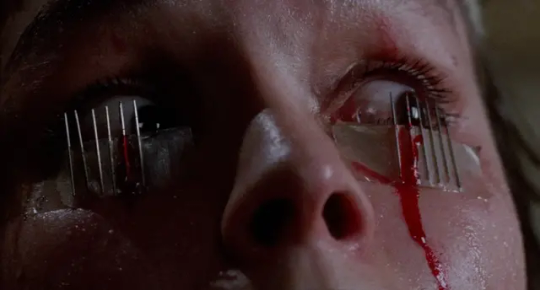
So I'm in the middle of this research project centered on Dario Argento's OPERA, for which I have required myself to watch as many screen adaptations of the Gaston Leroux novel The Phantom of the Opera as I can take. What I have determined so far is that the Phantom of the Opera is a story everyone wants to tell, but not very many people are sure of how to tell it. In fact, it's not that easy to say what it is about archetypally. You know, Wolfman stories are typically about "the beast in man" (with femininity positioned as some sort of cure for this personality split), Frankenstein stories are usually about human nature (i.e. an uncanny creature can have more humanity than vain and bigoted humans), Dracula-type vampire stories are most generally about the problems of being an outsider (queer, foreign, etc). But Phantom of the Opera is like...well, everyone likes the love story part of it, which is more or less modeled on Dracula, with a woman torn between seductive darkness and the safety of square society. But then there are all these other parts that seem to flummox people in the retelling.
I haven't read the Leroux novel YET but the first round of movies have been interesting, and also sort of perplexing. The iteration from 1925 holds up, largely due to Chaney's creation of the Phantom which remains a top tier monster. People don't often talk about the mask though! Which looks like a cross between Peter Lorre and the Devo Boogie Boy, it's disturbing and I like it.
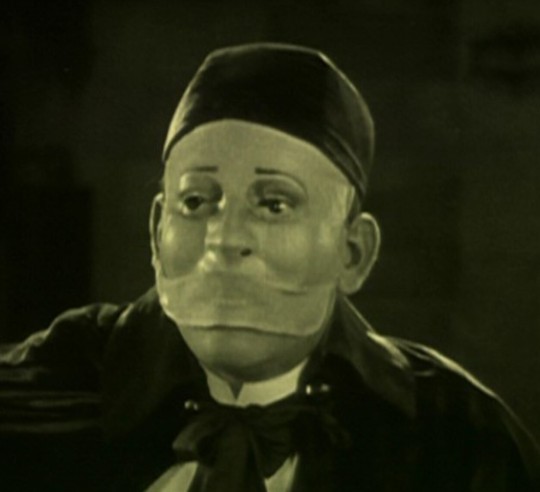

This Phantom was born in the dungeons during a revolutionary bloodbath and is disfigured from birth, drawing on the antique idea that a mother's trauma is translated in the deformity of her children; also, compellingly, these dungeons lie fathoms beneath the opera house where the bourgeoisie are witlessly dancing on the graves of martyrs and criminals embodied in the Phantom. The ingenue Christine is an interesting figure who breaks up with her boyfriend at the beginning because she wants to give her whole self to her career; when the Phantom starts murmuring to her through the walls it's as if the spirit of opera itself has chosen her to be its avatar, which she seems to find totally rational. It's sort of cool, what other movie of this era has a likeable heroine choosing her potential for greatness over love? This is the element of the story that is the most interesting, but I'll expand on that in a minute.
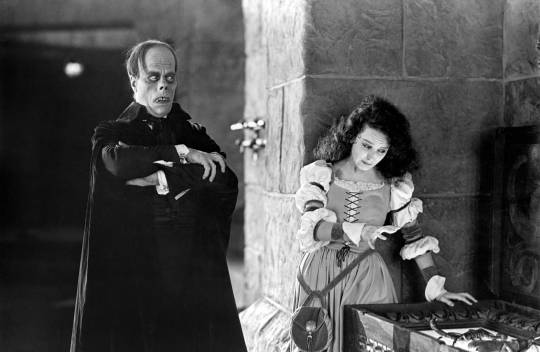
The Chaney edition benefits a lot from keeping things simple. The 1943 version with Claude Raines has a little bit too much going on and the story doesn't get a lot of time to congeal between so many long opera sequences; this movie really takes the opera part of the title seriously! Actually they're the best thing about it, mostly because of Nelson Eddy who is extremely beautiful and a real opera singer, and who projects this blazing desire for Susanna Foster that is incredibly convincing. Like I'd normally say they have great chemistry, but I think it's just a lot of power radiating from him specifically.
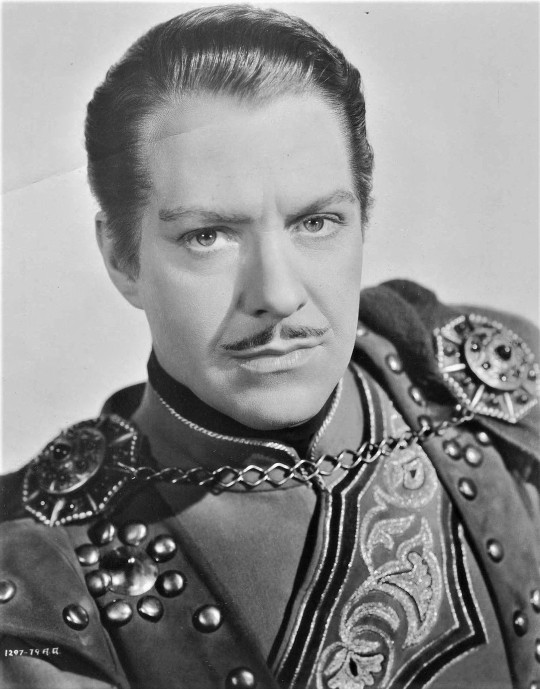
Ahem.
Uh anyway. This movie picks up the reoccurring (but not universal) idea that the Phantom is a genteel and sophisticated composer who has just fallen on hard times, who goes mad when his latest concerto is stolen. He is disfigured while struggling with the plagiarist and installs himself under the opera house where he can haunt his former protege Christine, who is already torn between dreamy Nelson Eddy and her stuffy cop boyfriend. One of my favorite things here is that even though this film is extremely quaint and old fashioned, everybody hates cops; this Christine is less a self-determined careerist than someone who is under pressure from her artist friends who find it profoundly repulsive that she is dating a policeman. Meanwhile the Phantom is just way too gentle and sappy, which is extra disappointing because Claude Rains's Invisible Man is so fabulously chaotic and sadistic, it made me really aware of the Phantom that could have been. This one doesn't properly represent the high society vs. underworld dichotomy that Christine should be torn between. So what is this movie about? There's so many guys in it and a few different themes flapping in the breeze. Is it about love? Is it about self-actualizing through art? Is it about the cutthroat world of showbusiness? It doesn't have that much to say, ultimately, and it just seems really unmotivated. Also I don't like this mask, sue me.
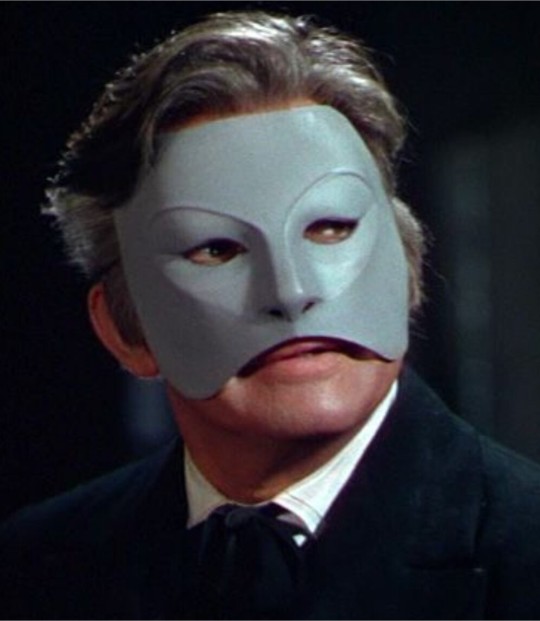
The Hammer edition is even more disappointing, considering the studio's previous successes with Universal Monster remakes. Here Christine is torn between a suave opera producer, the lecherous composer who has plagiarized the Phantom, and yeah the Phantom. Too many guys, it confuses whatever the dynamic and themes are supposed to be. Michael Gough as the plagiarist is so much more evil and threatening than poor Herbert Lom's Phantom that it's hard to stay focused on the main point here. Curiously the Hammer version is rather unromantic, with the Phantom just slapping Christine around until she sings his tunes right; that is kind of refreshing in a way, although it also means that the film lacks tension, which contributes to its being surprisingly anticlimactic. The best guy in the movie is actually Thorley Walters whose character serves almost no narrative purpose at all, he just hulks around with this WTF? look on his face and it is kind of adorable. I guess I like the gross mask in this one, too.
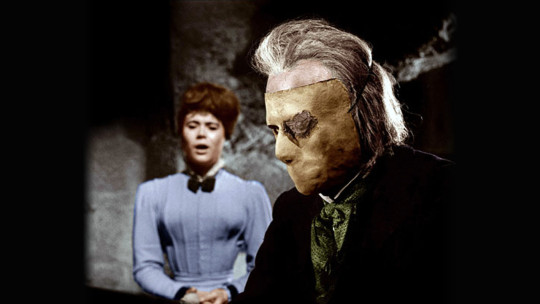
But the Hammer version has one interesting strength, which is that Christine is singing the lead in a new opera about Joan of Arc. Just like Joan, Christine hears a disembodied voice prophesizing her ascent to power. The best thing about the Phantom lore is the idea that the woman has this latent power that can either be activated by the Phantom, or suppressed by her square boyfriend (the relationship being mutually exclusive with opera stardom in many iterations). She isn't just a love object to be possessed, she herself possesses of some kind of devastating energy that needs to be awakened and channeled--or contained and forgotten, if she decides to get married and stay home or something. This is pretty cool, and it is interestingly realized in Dario Argento's OPERA, in which (spoiler alert I guess) a killer stalks an opera singer with the aim of catalyzing her own latent psychopathy. This idea is at the center of my thesis and I'm looking forward to fleshing it out, although I'm kind of dreading all the other PHANTOMs that I have committed myself to watching. I really don't want to deal with Andrew LLoyd Webber at all, but after I get through at least the Joel Schumacher one of the those I'm going to reward myself with a rewatch of PHANTOM OF THE PARADISE which I'm going to guess right now is the best retelling of this story after the Chaney one. I'm counting on Paul Williams' music to be catchier than Webber's.
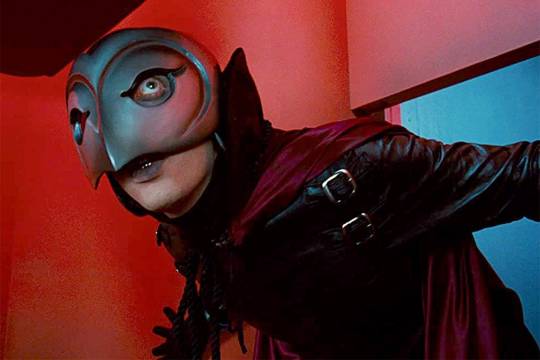
I'm whining about my own decisions, I know, but really the main hardship of this project is that now I keep getting the Vandals' punk theme song from PHANTOM OF THE MALL: ERIC'S REVENGE stuck in my head, and let me tell you that is very unwelcome. Here it is, if you've decided you're done being happy and sane:
youtube
#is this when i finally watch KISS MEETS THE PHANTOM OF THE PARK?#is this project going to destroy me#phantom of the opera#claude rains#lon chaney#herbert lom#dario argento#opera#Youtube
51 notes
·
View notes
Text



Welcome to the 14th installment of 15 Weeks of Phantom, where I post all 68 sections of Le Fantôme de l’Opéra, as they were first printed in Le Gaulois newspaper 115 yeas ago.
In today’s installment, we have Part III of Chapter 6, “Le Violon Enchanté” (“The Magic Violin”).
This section was first printed on Wednesday, 13 October, 1909.
For anyone following along in David Coward's translation of the First Edition of Phantom of the Opera (either in paperback, or Kindle, or from another vendor -- the ISBN-13 is: 978-0199694570), the text starts in Chapter 6 at Raoul's inner dialogue, “She’s staying at the Setting Sun Inn, must be, it’s the only one!” and goes to the description of the old church at Perros, “The sacristy door opened onto this gruesome rampart, a feature of so many old Breton churches.”
There are some differences between the Gaulois text and the First Edition. In this section, these include (highlighted in red above):
1) Compare the Gaulois text:
Cet anniversaire et votre apparition si subite l’autre soir dans ma loge, tout cela m’avait reporté loin, bien loin dans le passé, et je vous ai écrit comme une petite fille que j’étais alors, comme une petite fille qui joue et qui serait heureuse de revoir, dans un moment de tristesse et de solitude, son petit camarade à côté d’elle…
To the First Edition:
Votre apparition si subite l’autre soir dans ma loge, m’avait reporté loin, bien loin dans le passé, et je vous ai écrit comme une petite fille que j’étais alors, qui serait heureuse de revoir, dans un moment de tristesse et de solitude, son petit camarade à côté d’elle…
Translation from the Gaulois:
"That anniversary and your sudden appearance in my dressing room the other evening, all that took me back, far back into the past, and I wrote to you as the little girl that I was then, as a little playful girl who would be happy, in a moment of sadness and solitude, to once again see her little friend by her side..."
Translation from the First Edition:
"Your sudden appearance in my dressing room the other evening took me back, far back into the past, and I wrote to you as the little girl that I was then, who would be happy, in a moment of sadness and solitude, to once again see her little friend by her side..."
2) Compare the Gaulois text:
Le jeune homme veut la prendre dans ses bras
To the First Edition:
Le jeune homme veut la saisir
Translation from the Gaulois:
The young man tried* to take her in his arms
Translation from the First Edition:
The young man tried* to catch her
* Note: I have translated Leroux’s use of the historical present using the past tense, as is more common in English writing.
3) Minor differences in punctuation and italicization.
Click here to see the entire edition of Le Gaulois from 13 October, 1909. This link brings you to page 3 of the newspaper — Le Fantôme is at the bottom of the page in the feuilleton section. Click on the arrow buttons at the bottom of the screen to turn the pages of the newspaper, and click on the Zoom button at the bottom left to magnify the text.
#phantom of the opera#poto#gaston leroux#le fantôme de l’opéra#le gaulois#phantom translation#15 weeks of phantom#phantom 115th anniversary
12 notes
·
View notes